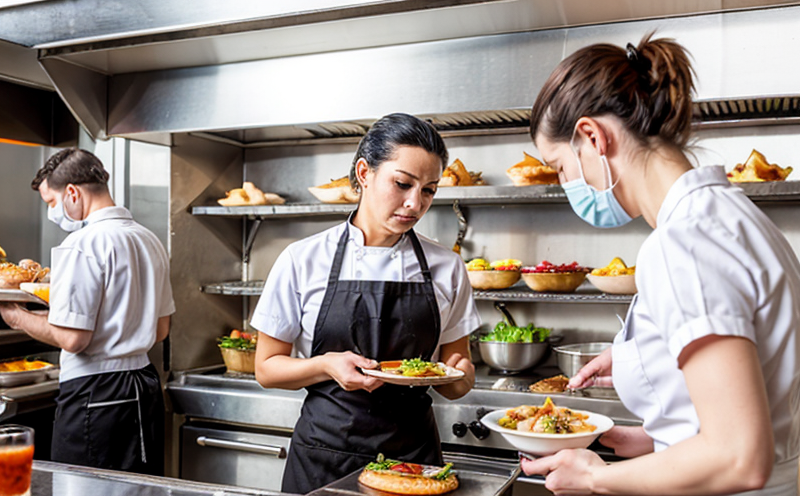Restaurant food safety inspection
The restaurant industry plays a pivotal role in ensuring public health and maintaining consumer trust. Food safety inspections are critical to prevent foodborne illnesses, maintain hygiene standards, and comply with regulatory requirements. This service ensures that restaurants operate within the strictest guidelines set by health authorities and international standards.
At our laboratory, we provide comprehensive food safety inspection services tailored specifically for the restaurant sector. Our team of experts uses advanced testing methods and state-of-the-art equipment to ensure that every aspect of your restaurant's operations is in compliance with local and international food safety regulations.
The first step in any food safety inspection is a thorough review of your restaurant’s policies, procedures, and practices. This includes assessing your HACCP (Hazard Analysis and Critical Control Points) plan, employee training programs, and sanitation protocols. During this phase, we identify areas where improvements can be made to enhance food safety.
Next, our laboratory conducts a series of tests on the raw materials used in your kitchen. This includes testing for pathogens such as Salmonella, E. coli, and Listeria, as well as verifying that ingredients meet nutritional standards. We also examine packaging materials and storage conditions to ensure they are safe for use.
The cooking process is another crucial area of focus during a food safety inspection. Our laboratory checks the temperature at which food items are cooked, ensuring it meets the required minimum temperatures specified by health authorities. For example, ground beef should be cooked to an internal temperature of 71°C (160°F) or higher to kill harmful bacteria.
After cooking, our team inspects the cooling and storage procedures for hot and cold foods. Proper handling of these items is essential to prevent cross-contamination and ensure food safety throughout the entire process. We also check refrigeration units to confirm they maintain the appropriate temperature ranges.
Finally, we review your restaurant's cleaning and disinfection practices. This involves examining kitchen equipment, utensils, and surfaces used in food preparation to ensure they are thoroughly cleaned and sanitized between uses. Proper hygiene is key to preventing the spread of germs and ensuring that your customers enjoy a safe dining experience.
Our laboratory also offers microbiological testing services for pathogens such as Salmonella, E. coli, Listeria, and Campylobacter. These tests are conducted on samples taken from various points in the food production chain, including raw ingredients, cooked dishes, and finished products.
In addition to pathogen testing, we can also perform chemical analysis of your restaurant’s water supply, cleaning agents, and other chemicals used during the preparation process. This helps ensure that these substances do not pose a risk to human health when consumed.
Our team at the laboratory provides detailed reports following each inspection, highlighting any issues found and offering recommendations for improvement. These reports are designed to help you address specific concerns and bring your restaurant into full compliance with all relevant regulations.
Quality and Reliability Assurance
- Pathogen testing for Salmonella, E. coli, Listeria, and Campylobacter.
- Microbiological analysis of water supply and cleaning agents.
- Chemical analysis to ensure safe use of chemicals in food preparation.
- Review and assessment of HACCP plans and employee training programs.
- Inspection of cooking temperatures for various types of food items.
- Checking refrigeration units to maintain appropriate temperature ranges.
- Evaluation of cleaning and disinfection practices used in the kitchen.
Customer Impact and Satisfaction
By ensuring that your restaurant adheres to strict food safety standards, our laboratory helps protect both your reputation and customer trust. In a world where foodborne illnesses can have serious consequences, maintaining high levels of hygiene is not only essential but also a legal requirement.
A clean kitchen and safe food preparation processes contribute significantly to enhancing the overall dining experience for customers. When diners know that they are eating in an environment free from contamination risks, they feel safer and more satisfied with their meal. This can lead to increased customer loyalty and positive word-of-mouth recommendations.
Moreover, our laboratory’s rigorous testing procedures give you peace of mind knowing that every aspect of your restaurant’s food safety practices has been thoroughly evaluated. You’ll receive clear insights into any areas needing improvement so that you can make informed decisions about how best to address them.
Use Cases and Application Examples
| Use Case | Description |
|---|---|
| New Restaurant Opening | A new restaurant opening requires thorough pre-opening inspections to ensure compliance with local regulations. |
| Periodic Compliance Checks | Regular checks are necessary to maintain ongoing compliance and catch any lapses early on. |
| Post-Incident Audits | After an incident, a detailed audit helps identify root causes and implement corrective actions. |
| HACCP Plan Verification | Verification of HACCP plans ensures that your restaurant has implemented effective risk management strategies. |
| Ingredient Supplier Audits | Audit suppliers to ensure they meet the same stringent standards as your own kitchen. |
| Employee Training Assessments | Evaluating employee training programs helps ensure that staff are well-informed about proper food handling practices. |
| Cleaning and Sanitization Practices | Reviewing cleaning protocols ensures that all surfaces and equipment are kept hygienic throughout the day. |





